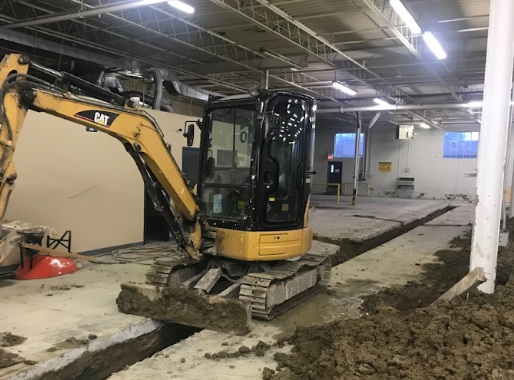- Last updated: January 15, 2025
Why Is There a Sewer Smell in My Basement?

A sewer smell in your basement can be both alarming and unpleasant, signaling underlying issues with your plumbing system that need immediate attention. At Crystal Drain & Plumbing, we understand the urgency of addressing these problems. Here’s a detailed guide on the common causes of sewer smells in your basement and the solutions to fix them.
Common Causes of Sewer Smells in Your Basement
1. Dry Floor Drains
Issue:
Rarely-used floor drains in your basement can dry out over time. These drains have a trap designed to hold water, acting as a seal to prevent sewer gases from entering your home. When the water evaporates, it can no longer block the gases, leading to unpleasant odors.
Solution:
Pour a few gallons of water down the drain to restore the water seal. Additionally, add a cup of baking soda, a cup of vinegar, and three cups of boiling water. Repeat the process if necessary. If the smell persists, you may need to use a drain auger to clear any blockages or call a professional plumber for further assistance.

2. Ejector Pit & Pump Issues
Issue:
Homes with overhead sewer lines often have an ejector pit to handle waste water from basement fixtures. A missing or improperly sealed lid, or a blocked vent, can allow sewer gases to escape.
Solution:
Ensure that the ejector pit has a properly fitted lid with a good seal. Inspect the waste discharge pipe and vent pipe for any cracks or obstructions and replace any faulty components to contain the sewer smell.
3. Stagnant Water in Sump Pump Pit
Issue:
When the sump pump hasn’t operated for some time, the water in the pit can become stagnant, leading to strong odors.
Solution:
Test your sump pump to ensure it is functioning correctly. Pour a few buckets of water into the pit to trigger the pump, allowing it to cycle and expel the stagnant water. Cleaning the pit walls with bleach can also help alleviate odors.
4. Improper Venting
Issue:
Improperly vented basement fixtures and appliances can prevent sewer gases from exiting your home effectively, leading to smells in your basement.
Solution:
Check that your laundry room and bathroom fixtures are properly vented and connected to the home’s main venting system. Correct any venting issues to ensure sewer gases are properly expelled.
5. Damaged Sewer Line
Issue:
A damaged sewer line can allow sewage to seep into the ground near your home, causing sewer smells in your basement.
Solution:
This issue requires professional intervention. A common method for detecting leaks involves using leak tracing dye in your bathtub or toilet and checking if the dyed water makes its way into the soil. If a leak is detected, a professional plumber can pinpoint the problem area and determine the necessary repairs.
6. Basement Drain Smell
A foul odor from your basement drain is often caused by a dry P-trap, clogs, or sewer line
issues. To resolve this, pour water into the drain to refill the P-trap, clean the drain to remove clogs, and check for any signs of sewer line problems. Regular maintenance and proper ventilation can prevent future odors. If the smell persists, contact Crystal Drain & Plumbing for professional assistance.
Preventive Measures and Maintenance Tips
- Regular Inspections: Have your plumbing system inspected regularly to catch issues early.
- Use Enzyme Cleaners: Regularly pour enzyme cleaners down your drains to break down organic matter and prevent clogs.
- Maintain Proper Ventilation: Keep your basement well-ventilated to disperse any lingering odors.
- Routine Cleaning: Clean your drains and sump pump pit periodically to prevent buildup and blockages.
- Check Seals and Lids: Ensure all seals and lids on drains, pits, and vents are properly fitted and maintained.

Trust Crystal Drain & Plumbing For All Your Plumbing Needs!
When it comes to resolving plumbing issues, trust only the best — Crystal Drain & Plumbing. With over 15 years of experience serving Toronto and the GTA, our certified technicians use advanced techniques and state-of-the-art equipment to provide fast, reliable service. Whether it’s a clogged drain, sewer smell, or any other plumbing concern, we offer 24/7 emergency services to keep your home safe and functional!
FAQs About A Sewer Smell In A Basement
If your sump pump pit smells, test the sump pump by pouring water into the pit to trigger the pump and expel stagnant water. Clean the pit walls with bleach to reduce odors. Regular maintenance of the sump pump can prevent stagnant water and associated smells.
You should call a professional if the sewer smell persists despite your efforts, if you notice sewage backup, or if multiple drains are clogged. Professional plumbers can inspect for deeper issues like broken sewer lines or improper venting and provide effective solutions.
Yes, temperature changes can cause sewer smells in your basement. Cold weather can cause the water in your P-traps to evaporate more quickly, allowing sewer gases to enter your home. Regularly adding water to your drains during cold months can help maintain the water seal and prevent odors.
If you suspect a hidden leak, look for signs such as unexplained puddles, a sudden increase in your water bill, or water damage on walls or floors. A persistent sewer smell often accompanies these signs. It’s best to contact a professional plumber to detect and repair hidden leaks to prevent further damage and eliminate the odor.
